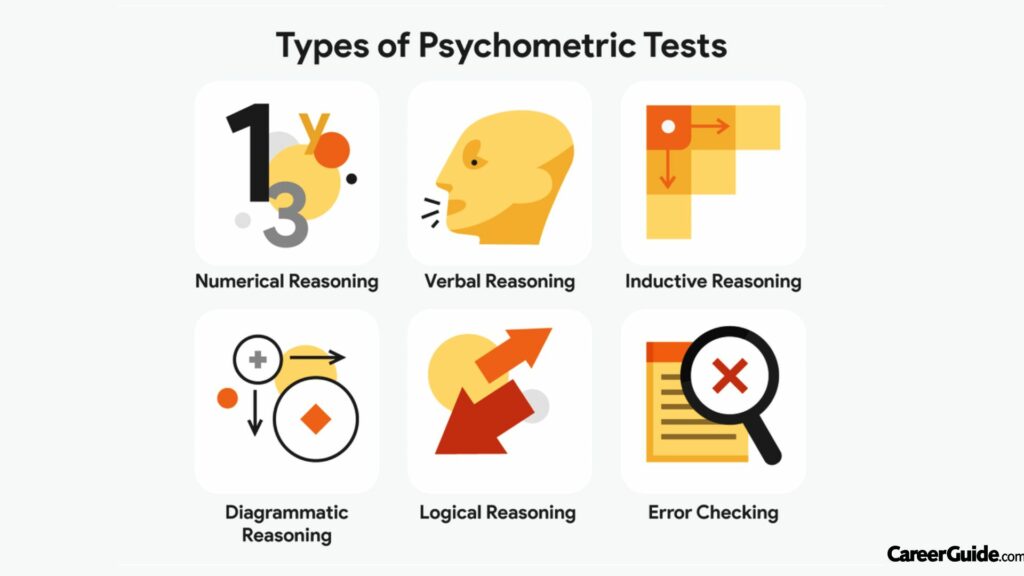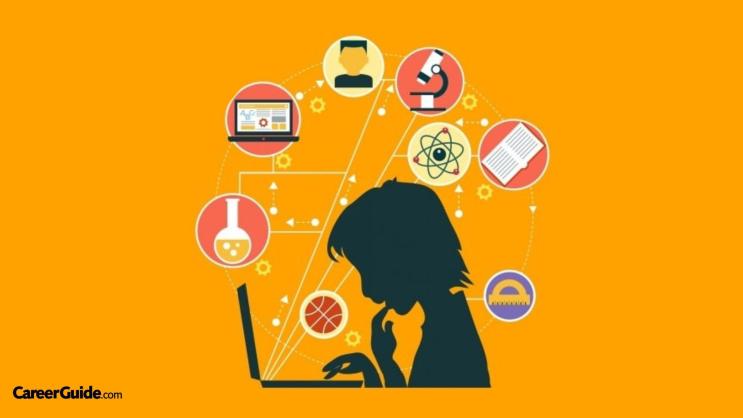Employers today are looking for people that are not only skilled but also honest and have good behavioral characteristics. But, in a 15-minute interview, how can a recruiter learn about these subtle features in a candidate? Psychometric Testing tools is the most effective technique to do so. Employers today are looking for people that are not only skilled but also honest and have good behavioral characteristics. But, in a 15-minute interview, how can a recruiter learn about these subtle features in a candidate? A psychometric test is the most effective technique to do so. Let’s look at why are psychometric testing tools used by companies.
- For in-depth interviews with a defined goal
- The chances of faking the exam are slim to none
- Psychometric testing tools take less time than other types of tests
- There are fewer chances of making mistakes
- It is feasible to conduct unbiased interviews
- Examines an applicant’s willingness to work
- Maintain a level of consistency throughout the hiring process
- Professional Skill Index Test
- Skill Based Career Test for 9th
A psychometric personality test is a type of assessment that measures an individual’s personality traits, behaviors, and emotions. These tests are used to understand an individual’s strengths, weaknesses, and tendencies, and are commonly used in various settings such as employment selection, education, and career counseling. These tests typically consist of a series of questions that measure an individual’s preferences, attitudes, and tendencies in different areas, such as introversion/extroversion, emotional stability, openness, and conscientiousness.
The format and content of online psychometric tests vary, but they typically involve answering a series of questions or completing tasks within a set time frame. The results of the tests are then analyzed and interpreted to provide an accurate picture of an individual’s abilities, traits, and interests. It is important to keep in mind that online psychometric tests are just one aspect of the assessment process and that results should be used in conjunction with other information, such as work experience, education, and references.
For in-depth interviews with a defined goal
The first argument for including Psychometric testing tools in interview processes is to increase the quality of the hiring process by helping hiring managers to make well-informed hiring decisions. There are numerous scientific and reliable tools that can accurately assess a candidate’s ability to handle and manage professional activities such as teamwork, stakeholder management, coping with high pressure, and finding analytical answers to difficult problems. In-depth interviews can be an effective tool for exploring specific topics or gathering detailed information from an individual, but they require careful planning and execution to be most effective. When conducting an in-depth interview, it’s important to have a clear understanding of the goals and objectives of the interview and to prepare a structured set of questions that will help you to achieve those goals. Additionally, it’s important to create a supportive and non-threatening environment that encourages the interviewee to open up and share their thoughts and experiences. When done properly, in-depth interviews can provide valuable insights into a person’s attitudes, behaviors, and motivations, which can inform a wide range of decisions and evaluations.
The chances of faking the exam are slim to none
There is no defined pattern in complex psychometric testing tools designs where candidates can cheat on the exam. Candidates are required to answer honestly in such question papers, and any attempt to manipulate the question paper is immediately detected by the interviewer, raising major doubts about the applicant’s legitimacy. Employers like candidates who are honest in addition to having professional skills when they attend for interviews. While it is difficult to completely eliminate the possibility of faking in psychometric tests, they are designed to minimize the chance of deliberately misleading responses. For example, some tests use questions and response formats that are difficult to fake, and they may also include validity checks to detect inconsistent or unrealistic responses. However, it’s important to keep in mind that some individuals may still be able to fake their responses, and psychometric tests should be used in combination with other assessment methods to get a more complete picture of an individual’s abilities and potential.
Psychometric testing tools take less time than other types of tests
Interviewers have a restricted time range in which to make a decision and choose the best candidate. Psychometric tests are the most effective technique to learn about a candidate’s true personality and abilities. Instead of making individual judgments, interviewers can just assess the performance report. These reports will aid them in developing pertinent questions based on an applicant’s strong and weak points. Not necessarily. The time taken for psychometric testing can vary depending on the type of test and the complexity of the questions. Some psychometric tests can be completed within a few minutes, while others may take an hour or more. The length of the test depends on the purpose and the type of information being measured.
There are fewer chances of making mistakes
Unstructured interviews are the least authentic since a recruiter’s gut instinct is used to choose a candidate because no concrete proof of behavioral traits and talents can be measured in a short period of time. Psychometric testing tools are useful in this situation because the performance report created by such tests can clearly convey accurate information about an applicant’s ability. While psychometric tests are designed to minimize the chances of making mistakes, they are not error-proof. The accuracy of the results can be influenced by a variety of factors, such as the test-taker’s motivation, level of fatigue, or stress. Additionally, some psychometric tests require specific skills, such as the ability to follow instructions or solve problems, that may affect the test-taker’s performance. It’s important to understand the limitations of these tests and to use them in conjunction with other psychometric assessment methods to get a complete picture of an individual’s abilities and potential.
It is feasible to conduct unbiased interviews
Psychometric tests, which are completely based on analytical questions that one must answer according to his or her own logic, are used to make unbiased judgements regardless of caste, creed, gender, or religion. Interviewers find it simple to make the best recruiting decision based on the results. Furthermore, psychometric tests aid in achieving the goal of the recruiting process, determining what exactly a company is looking for and how well an applicant is suited for a given post. It is difficult to conduct completely unbiased interviews, as all human interactions are subject to some degree of personal bias. However, it is possible to minimize bias in interviews by using structured interview protocols, avoiding the use of leading questions, and training interviewers on cultural sensitivity and unconscious bias. Additionally, using objective selection criteria and evaluating candidates against predetermined qualifications can help to reduce bias in the hiring process. Ultimately, reducing bias in interviews requires awareness, attention, and a commitment to fairness and impartiality.
Examines an applicant’s willingness to work
Completing a test entails more than simply submitting a résumé for a job application. A psychometric test takes time and effort, and the fact that a candidate is taking it indicates that he is dedicated to his job and wants to improve his profile. Before you hire someone, you need to know how they will act on the job. Psychometric approaches that focus on behavior and personality might reveal a candidate’s preferred communication styles, their ability to remain calm under pressure, and their personal motivations. Psychometric tests can provide some insight into an applicant’s work-related attitudes and personality traits, but they are not designed to directly measure an individual’s willingness to work. This information can be more effectively obtained through other methods, such as reference checks, previous work experience, and job-specific interviews. Additionally, an individual’s willingness to work can change over time and may not be accurately reflected by a single assessment.
Maintain a level of consistency throughout the hiring process
Completing a test entails more than simply submitting a résumé for a job application. A psychometric test takes time and effort, and the fact that a candidate is taking it indicates that he is dedicated to his job and wants to improve his profile. Before you hire someone, you need to know how they will act on the job. Psychometric approaches that focus on behavior and personality might reveal a candidate’s preferred communication styles, their ability to remain calm under pressure, and their personal motivations. Psychometric testing allows you to repeatedly use a dependable model, resulting in consistency at both the macro and micro levels of recruitment. It also provides benchmarks and insights that you can use in the future to help with future employee progress and engagement.
This is why, when it comes to hiring a new employee, psychometric tools have become so vital. As a job seeker, you must also understand why a company wants you to take a psychometric exam. On CareerGuide, you can also take these psychometric tests that will help you a lot. As a result, you’ll have a better understanding of the task at hand. In order to increase your chances of getting the highest possible score on the psychometric test, CareerGuide provides you with the tools you need.
Professional skills are the abilities and qualities that individuals possess that allow them to perform well in a particular profession or job. These skills can be both technical and non-technical, and they may include knowledge, expertise, problem-solving, communication, leadership, and adaptability.
Technical skills refer to the specific abilities that are required to perform a particular job or task, such as computer programming, data analysis, or financial planning. Non-technical skills, on the other hand, refer to personal attributes that are essential for success in any professional role, such as teamwork, time management, and communication.
Skill Based Career Test for 9th
There are a few types of skill-based career tests for 9th available online that can be taken by 9th-grade students. These tests evaluate a student’s abilities in areas such as communication, problem-solving, creativity, teamwork, and critical thinking. They can also help students identify their personality type, values, and interests.Once the results of the test are obtained, students can use them to explore various career options that align with their skills and interests. For instance, a student who scores high in creativity and problem-solving may be interested in pursuing a career in graphic design or computer programming.












